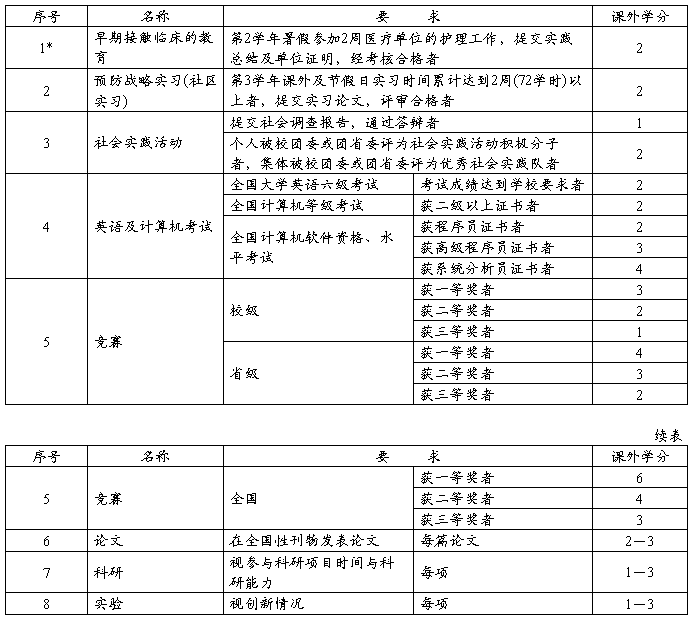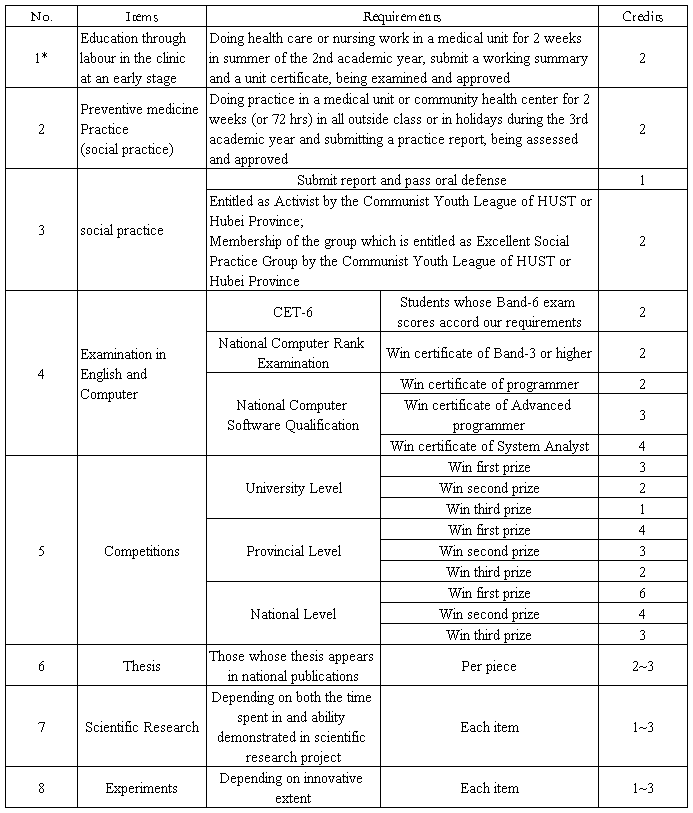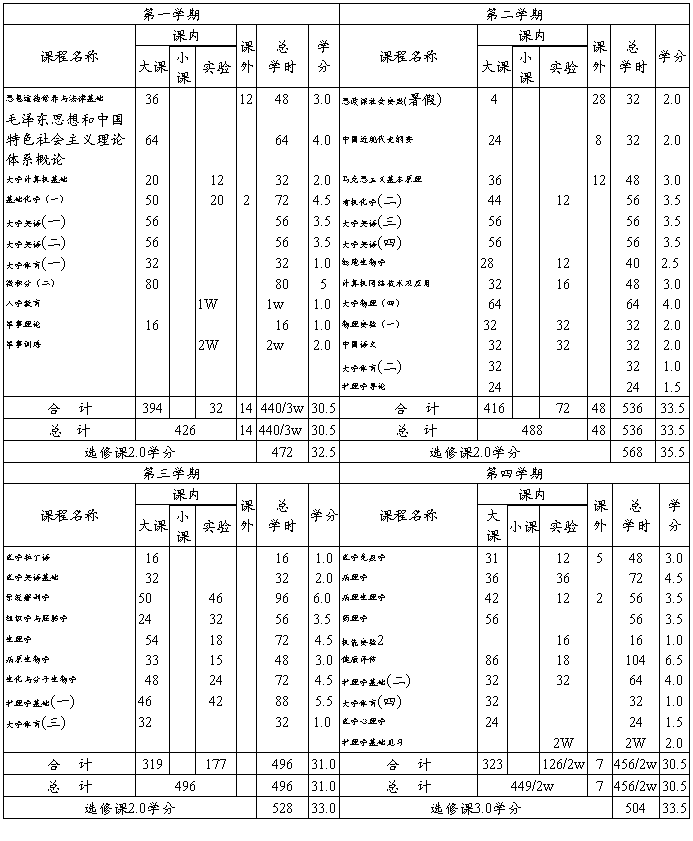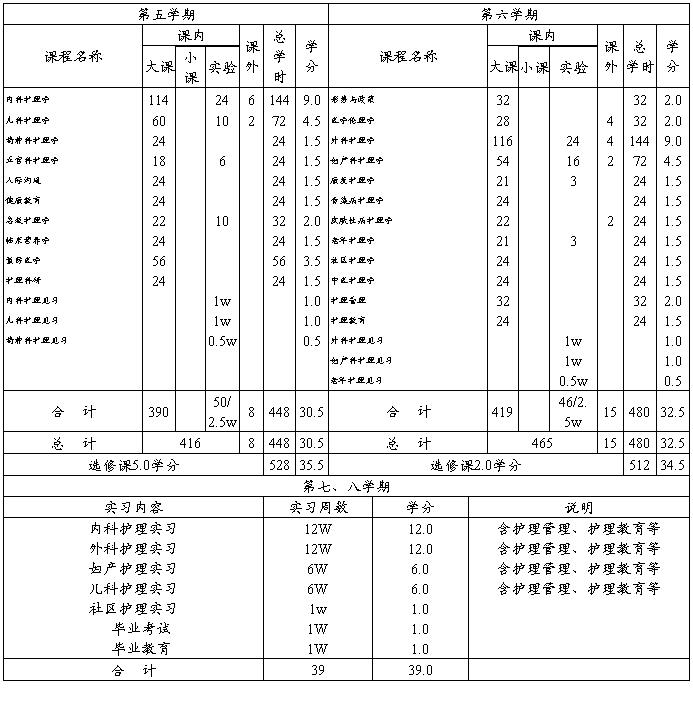护理学专业(四年制)本科人才培养计划
Undergraduate Program for Specialty in nursing (4-year’s schooling)
一、培养目标
Ⅰ. Educational Objectives
本专业培养具有良好素质的初级护师,这种素质可确保其毕业后作为护士时在上级护师指导下,从事安全有效的护理实践,保证他们有适当的基础能够进行终身学习和在护理学某些领域内进一步深造。
Cultivating elementary nurses of high quality that guarantees that they can engage in the nursing practice with effectiveness and security after graduation under the guidance of senior nurses and that they have proper foundation to go on study all their lives and make advanced study in a certain discipline field of nursing science.
二、基本规格要求
II.Basic standard required
本专业学生应掌握从事护理实践工作的医学基础理论、护理基本知识和基本技能,具备良好的思想道德和职业态度,为毕业后继续受教育打下坚实的基础。
毕业生应获得以下的态度、知识和技能:
Students of this specialty should master basic theory, basic knowledge and basic skills of nursing and possess the good thought, morals and job attitude so as to lay a firm foundation for the continued education after graduation.
Graduates should acquire the following morals, knowledge and abilities:
态 度 目 标
1.树立科学的世界观、人生观和价值观,具有爱国主义、人道主义和集体主义精神,愿为护理事业的发展贡献力量。
2.树立关爱病人观念,尊重病人人格,保护病人隐私;坚持以预防疾病发生、减轻和驱除患者的病痛为己任,认识到提供临终关怀的道德责任。
3.充分认识护患沟通与交流的重要性,并积极与病人及病人家属进行交流,使其充分理解和配合护理计划的制订与实施。
4.树立成本效益观念,注重选择合理的护理方案,充分掌握公平有效分配和合理使用有限资源的原则,充分利用可用资源达到康复的最大效益。
5.树立终身学习观念,充分认识到不断自我完善和接受继续教育的重要性。
6.树立正确的医学伦理观念,尊重个人信仰,尊重每一个人,理解其人文背景及文化价值。
7.树立实事求是的科学态度,对超出自己业务能力而不能有效安全处理的护理活动,能主动寻求其他护师的帮助。
8.始终将病人及社区的健康利益作为自己的职业责任。
9.具有创新精神和有敢于怀疑、敢于分析批判的精神,具有为新知识产生、新技能的发现做出贡献的意识。
10.尊重同仁,增强团队意识。
11.树立依法行事的观念,在职业活动中,学会用法律保护病人和自身的权益。
Attitude requirements
1. Establish scientific outlook on world, life and value, have the spirit of patriotism, humanitarianism and collectivism and wishes to contribute to the development of nursing science.
2. Establish the idea of caring about patient's, respect patient's personality, protect patient's privacy; adhere to the prevention of diseases and alleviation of patients’ sufferings as your own duty, and realize the ethical responsibility of providing end-of-life care.
3. Fully realize the importance of communications between nurses and patients and communicate with patients and their family members actively so as to make them fully understand and cooperate with drawing up and implementing of the nursing plan.
4. Establish the cost-effective idea, pay attention to selecting nursing plan rationally, apply correctly the principle of a fair and effective distribution and rational use of the limited resources, and fully utilize the available resources to attain the greatest benefit of rehabilitation.
5. Establish the idea of studying throughout one's life and fully realize the importance of unceasing self-perfection and continued education.
6. Establish the idea of medical ethics, respect personal faith, respect everyone, and have a good understanding of his background of human culture as well as the culture value.
7. Establish scientific attitude of seeking truth from facts; when meeting with nursing activities that go beyond one's own professional ability or that one cannot manage effectively and safely, seek the help of other nurses voluntarily.
8. Regard health interests of patients and the community as your own professional responsibility all the time.
9. Establish the initiative spirit and spirit of daring to doubt and of daring to analyze and criticize, have the ideology of wishing to make contributions to the formation of new knowledge and to the discovery of new skills.
10. Respect colleagues and establish team spirit.
11. Establish the idea of practicing medicine in accordance with the law and learn how to protect the patients and also your own rights and interests by using the law.
知 识 目 标
1.基本掌握生物科学、行为科学和社会科学的科学方法,并能用于指导未来的学习和护理实践。
2.掌握生命各阶段人体的正常结构、功能和心理状态。
3.了解人体各阶段各种常见病、多发病(包括精神疾病)的发病原因,认识到环境因素、社会因素及行为心理因素对疾病形成与发展的影响,认识到预防疾病的重要性。
4.掌握人体各阶段各种常见病、多发病和急、难、重症护理的基本原则和操作技术,具备专科护理和重症监护的技能;
5.熟悉基本的药理知识及临床合理用药原则。
6.掌握社区护理的基本理论、程序、方法和基本技能。
7.掌握健康教育、疾病预防和筛查的原则,掌握缓解与改善疾患和残障、康复以及临终看护的有关知识。
8.了解临床流行病学的有关知识与方法。
9.掌握常见急症、急救的护理原则。
10.熟悉传染病的发生、发展、传播的基本规律,掌握常见传染病的护理原则。
11.了解祖国传统医学的基本特点,树立整体观念,了解中医的辨证论治原则。
Knowledge requirements
1. Grasp the basic knowledge and scientific methods of bioscience, behavior science and social science, and use them for guiding study and nursing practice in the future.
2. Master the normal structure, function and psychological condition of the human body at different stages of life.
3. Grasp various kinds of pathogenic factors of common diseases, frequently-occurring diseases (include mental diseases) at different stages of the human body, realize the influence of environmental factors, social factors and behavior psychological factors on the formation and development of diseases, and realize the importance of disease prevention.
4. Grasp basic principles and techniques of nursing for common diseases, frequently-occurring diseases as well as acute, intractable, and severe disorders of the human body at different stages of life; possess skills of specialized care and intensive care.
5. Obtain the basic knowledge of pharmacology and principles of rational clinical use of drugs.
6. Grasp basic theories, procedure, methods and skills of the nursing in community.
7. Grasp the principles for health education, disease prevention and screening and possess the relevant knowledge of alleviating illnesses and disability and of promoting rehabilitation and hospice nursing.
8. Get acquainted with the relevant knowledge and methods of clinical epidemiology.
9. Grasp the principles of diagnosis and first aid for emergency cases.
10. Get acquainted with the basic laws for occurrence, development and spread of infectious diseases and grasp the principles for prevention and treatment of common infectious diseases.
11. Understand the basic characteristics of traditional Chinese medicine, establish the integrated conception and understand the dialectical theory of Chinese medicine.
技 能 目 标
1.具有全面、系统、正确地采集护理病史、规范书写护理病历和观察病情变化的能力。
2.具有较好的临床思维和表达能力。
3.掌握内、外、妇、儿各科常见病、多发病的护理常规及常用护理操作技术。
4.具有常见急症的急救及处理能力。
5.具有根据具体情况选择使用合适的健康评估技术,选择最适合、最经济、合乎伦理的护理方法的能力。
6.具有运用循证医学的原理进行护理实践,完善护理方法的能力。
7.具有与同仁、病人及其家属进行有效交流和调动他们合作的能力。
8.具有利用各种信息资源和信息技术进行自主学习与研究的能力。
9.具有对病人和公众进行有关健康生活方式、疾病预防等方面知识宣传教育的能力。
10.具有护理管理、教学和科研的初步能力。
11.具有一定的外语交流能力。
Skills requirements
1. Have the ability in gathering nursing history completely, systemically and correctly; and have the ability in writing nursing history normatively and in observing the changes of the patient’s conditions.
2. Have good clinical thinking and ability to express.
3. Grasp nursing routine and skills for the common diseases in internal medicine, surgery, gynecology, and pediatrics.
4. Have the ability in first-aid and management for emergency cases.
5. Have the ability in choosing and using the suitable health-evaluation skills according to concrete conditions and in choosing the most suitable, economical and ethical nursing methods.
6. Have the ability in applying the principles of evidence-based medicine to carrying out nursing practice and perfecting nursing methods.
7. Have the ability to communicate with colleagues, patients and their family members effectively and to arouse their cooperation.
8. Have the ability in making full use of various kinds of information resources and information technology to keep on study and research independently.
9. Have the ability in carrying out publicity and education to patients and the public about healthy life style, prevention of diseases, etc.
10. Have preliminary ability in nursing management, teaching and research.
11. Have the ability to communicate in foreign languages.
三、培养特色
Ⅲ.Program Features
将人文、信息、计算机知识与临床护理知识相结合,培养具有良好素质的初级护师。
This program integrates the knowledge of humanities、information and computer science with that of nursing so as to cultivate elementary nurses of high quality.
四、主干学科
Ⅳ.Major Disciplines
基础医学preclinical medicine、临床医学clinical medicine、护理学nursing
五、学制与学位
Ⅴ.Length of Schooling and Degree
学制:基本为四年,实行弹性学制
Basic system: 4 years, plus flexible system
学位:理学学士
Bachelor of medicine degree or science degree
六、学时与学分
Ⅵ.Hours/Credits
完成学业最低课内学分(含课程体系与集中性实践教学环节)要求:243.5
Minimum Credits of Curricular (comprising course system and intensified internship practical training):243.5
完成学业最低课外学分要求:5
Minimum Extracurricular Credits: 5
1.课程体系学时与学分
Hours/Credits of Course System


2.集中性实践教学环节周数与学分
Weeks/Credits of Intensified Internship and Practical Training


3.课外学分
Extracurricular Credits

注:1.参加校体育运动会获第一名、第二名者与校级一等奖等同,获第三名至第五名者与校级二等奖等同,获第六至第八名者与校级三等奖等同。
2.*标注的项目为必须完成的项目。

Notes: 1.In HUST Sports Meeting, the first and the second prize, the third to the fifth prize, and the sixth prize to the eighth prize are deemed respectively the first prize, the second prize and the third prize of university level.
2.“*” shows that the item and requirements must be completed by every student.
七、主要课程
Ⅶ.Main Courses in Specialty
人体解剖学Human Anatomy、病原生物学Medical Microbiology、生理学Physiology、生物化学Biochemistry、病理学Pathology、药理学Pharmacology、基础护理学Fundamentals of nursing、内科护理学Medical nursing、外科护理学Surgical nursing、妇产科护理学Gynecological & obstetrical nursing、儿科护理学Pediatric nursing、老年护理学Gerontological nursing、社区护理学Community nursing、皮肤性病护理学Dermatological and venereal nursing、精神科护理学Mental health nursing
八、主要实践教学环节(含专业实验)
Ⅷ.Main Internship and Practical Training (Including experiments)
临床见习Clinical Extern、临床实习Clinical Intern
九、教学进程计划表
Ⅸ.Table of Teaching Schedule
院(系):同济医学院 专业:护理学(四年制)
School(Department): Tongji Medical college Specialty: Nursing(4-year’s schooling)

十、说明
Ⅹ. Directions:
各门课程应精选和更新教学内容,改进教学方法,强化基本理论、基本知识和基本技能的训练,加强自学能力、实践能力、外语及计算机应用能力和初步科学研究能力的培养,加强早期接触临床,注重基础与临床的渗透,加强医德医风教育,增强预防为主的观念,加强文、理知识,提高心理素质,拓宽学生的专业面和知识面,注重人际交流,增强社会适应性,提高学生的整体素质。
在课程改革中,要注重形态学科课程应以减少讲授、增加实验为主:机能学科课程应削减验证性实验,增加综合性实验,提高动手能力;临床课程应减少理论讲授,增加床边教学,以适应国内外医学教育改革和发展的趋势。
1.教学内容分课内和课外教学,课内教学形式包括大课、小课(讨论课、案例教学等)、实验课、见习、实习等:课外教学是指学生通过课外自主学习、社会实践等形式学习教学大纲要求的教学内容(不包括学生复习)。
2.军事教育:在集中军训期间,安排16学时的军事理论。
3.外语教学:公共外语采用分级教学,要求必须通过国家英语四级考试。专业外语教学除开设《医学英语基础》课程外,各门课程应安排10%的学时进行专业外语教学,平均每学时应至少介绍和反复应用10个常用专业外语词汇。每学年至少有1~2门课程使用外文教材,采用外语教学。
4.科研能力训练:科研能力训练贯穿在各个教学环节,在第1—8学期教学阶段,学有余力的学生可参加课外科研活动;结合假期社会实践,进行科研训练。
5.按选修课的有关规定,选课可跨学校、跨院系、跨专业、跨学年或跨学期选课。
6.临床实习:第4-8学期安排临床见习、毕业实习、和社区实习。
7.选修课程的开设是为了加强个性培养,拓宽知识面,学生可根据自己的兴趣、爱好、学习进程自由选择,且完成相应课程类别所要求的选修课程学分。同时学生可根据自己的兴趣,在临床护理实习后可任选一种专业方向实习。
8.课外学分除学生应完成的项目外,前7学期尚未修满者,第8学期可用选修课学分替换。
Every course should carefully select and renew teaching content and improve teaching methods; strengthen the training of basic theory, basic knowledge and basic skills; enhance the cultivation of self-study ability, practice ability, foreign language and computer application ability, and preliminary ability in scientific research; pay attention to an early contact with clinic, the infiltration between basis and clinic and the concept of prevention first; lay stress on the imparting of knowledge of liberal arts and science, broaden students’ range of specialty and knowledge; improve psychological quality and medical ethics; pay attention to interpersonal communication and promote social adaptation.
In the curriculum reform, particular attention should be given to the following ways: morphological courses should reduce theoretical teaching and increase experiments, functional courses should reduce testifying experiments and increase comprehensive experiments, improving the students’ ability of doing by themselves; clinical courses should reduce theoretical teaching and increase bed-side teaching so as to adapt the tendency of reform and development of medical education abroad and at home.
1. Teaching content is passed on both in class and outside class. Forms of in-class teaching consist of big class, small class (discussion, case analysis, etc.), experiments, extern, intern and so on; outside-class teaching indicates that students learn the teaching content of the syllabus by way of automatic study outside class, social practice and other forms (not including students’ regular reviewing of their lessons).
2. Military education: In the period of military training, there should be 16 hrs for military theory teaching.
3. Foreign language teaching: General foreign language adopts the system of grade teaching
and requires that every student must pass the National College English Test Band Four. Specialized foreign language teaching offers at least 10% of the class hour of foreign language studying for every courses as well as the course “Elementary medical English”. At least 10 common specialized foreign vocabularies should be introduced and used repeatedly within every class hours. At least 1 to 2 courses adopt foreign language textbooks or foreign language teaching in every schooling year.
. 4. Research ability training: Ability training for scientific research should be carried out through all links in the teaching process. In the 3rd-8th semesters, students studying with remaining strength are encouraged to take part in research activities outside class. In conjunction with preventive medicine social practice (community practice) and holiday social practice, training in research work can be carried out.
5. According to the regulations concerned about course selection, courses can be selected in a
way of interschool, intercollege, interspecialty, cross-academic year or cross-semester.
6. Clinical practice: Clinical extern and graduation intern are arranged in the 4th to 8th semesters.
7. The purpose of offering elective courses is to strengthen the students’ individual character development and broaden their range of knowledge. Students can select any of them according to their interest, need and course schedule and finish the selective corresponding credits that required for every courses. In order to fully develop the students’ individual characters, Job-oriented selective course of clinical practice 4 weeks according to his own interest.
8. Outside-class credits: If students have finished the fixed items (6 or 7 credits) but haven’t completed all the rest up to the 7th semester, the missing credits can be made up by those of elective course in the 8th semester.
十一、基准学期进程安排表


注:1-6学期,每学期安排形势与政策3学时。
